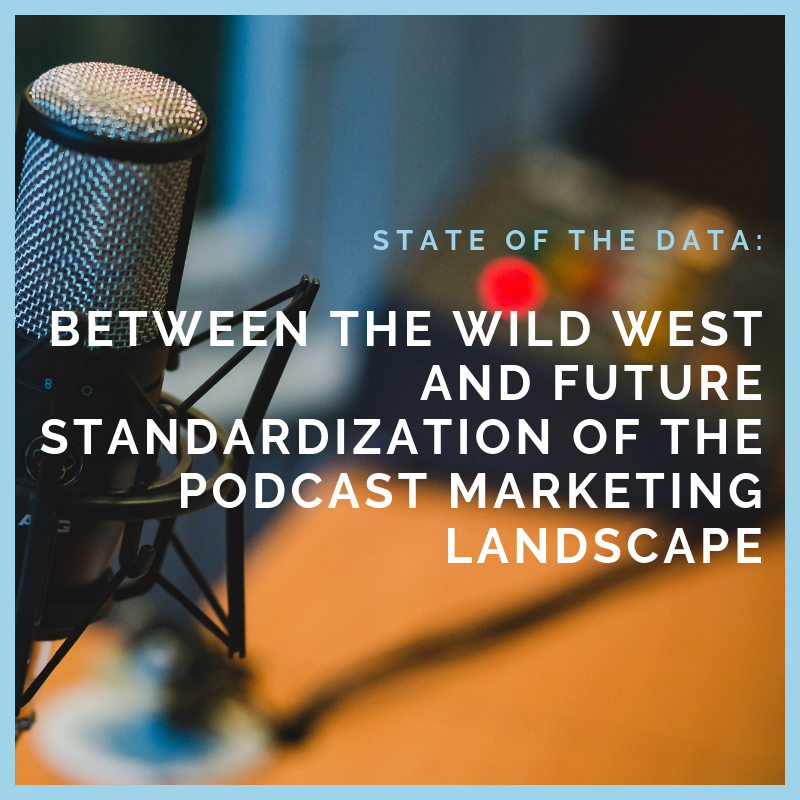It gets worse: downloads are not equal to listens, and downloads are measured in different ways by the different companies that host the podcasts. The audio files themselves are typically downloaded in little packets, in some cases each little packet has been counted as a ‘download.’ The aspiring sheriff in this Wild West, the IAB, has established a set of guidelines for the industry (“IAB 2.0”) and—while not a panacea—this has certainly helped push the market in the right direction. Marketers should be sure to know which of their partners are IAB 2.0 compliant. It’s easy to compare apples to oranges in this market. Part of the maturation in the market is evident in the attribution solutions galloping towards the saloon. (Just how far can we stretch the Wild West narrative?! We don’t even know yet!) In the second half of last year, networks began pushing attribution solutions based on IP-matching. This works by comparing the IP address of the device downloading the podcast with the IP addresses of the customers who took subsequent action on a website. If the addresses match, it’s assumed the podcast drove the activity and – hey presto! – podcast takes a giant leap towards accountability. There remain limitations for marketers. You might partner with a network like Wondery for example, for access to their solution through their relationship with Qualia (now IDify). It may be a great solution, but if only 10% of your investment is on that network, you don’t have a very comprehensive solution. Or you could work with Megaphone: their solution is built on their dynamic ad insertion platform, which can limit your ability to attribute live reads or ‘baked in’ ads. Emerging market leaders are digital natives, rather than radio natives, and this is what gives them a head start in the attribution game. For example, IP-matching is not an exact science, and IP addresses change not infrequently. Therefore, a more comprehensive solution is required than most are offering. Podcast aside, sophisticated digital solutions involve device graphs. These are still nascent in their podcast application, but are finally coming to market. And really robust attribution solutions require more than a simple exposed-action tracking system. Wouldn’t some of these people have taken action anyway? Robust measurement requires use of control group. Leading vendors are building this into their approach, and as the these sophisticated, digitally-native solutions permeate the industry the brands will come calling. The attribution solutions and the IAB standards add legitimacy, media currency, and accountability to the previously lawless land. This makes brands and their big agencies feel safe, and they’ll then be helplessly drawn to the authenticity and depth of connection available to audiences on podcast. This may bring fresh challenges, however. Big brands seem deeply attractive to podcasters and networks, because of their ability to lose podcast-sized budgets down the back of the sofa. It’s not all roses, however, because big brands need a lot of control. They’re anxious and cautious about letting hosts shape their message, improvise off the script, or heaven forbid, freestyle the whole darn thing. Yet often this is what works most effectively; this has been precisely the magic of podcast for the early marketers. When these hosts give a deeply personal read they are able to drive fantastic response from their audience. The brands’ fear will hurt them, then, and they will insist on pre-recorded, pre-approved ad units that may rarely even use the hosts voice, and in so doing will ironically turn the podcast medium into a much more traditional, radio-like medium with more dull, impersonal ads. And because these will be dynamically inserted, there will be much more scope for a high-ad load, which may threaten the very foundations of the business: the intimacy, the authenticity, the personal touch. While the new sheriffs may be bringing some law and order, let’s hope they don’t end up sanitizing the place altogether. |
Categories
All
Archives
November 2023
|
|
Locations:
New Orleans, LA Nashville, TN |
|
Digital Media Ghost @2020
|



 RSS Feed
RSS Feed
